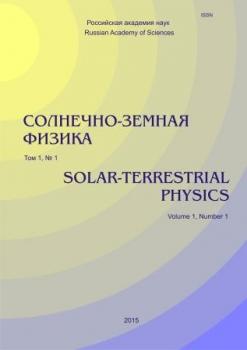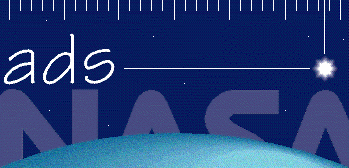Sankt-Peterburg, Russian Federation
Sankt-Peterburg, Russian Federation
Sankt-Peterburg, Russian Federation
Irkutsk, Russian Federation
The geomagnetic cutoff rigidity of cosmic rays (CRs) is the main factor regulating the arrival of CR particles at a given point on Earth's surface or inside the magnetosphere. To study the relationship between cutoffs and near-Earth space parameters, we have selected the strongest magnetic storm that occurred on March 8–11, 2012 during the CAWSES-II interval, recommended by SCOSTEP for detailed studies of solar-terrestrial relations. We have found the geomagnetic cutoffs by two methods: 1) by trajectory calculations in the magnetic field of the perturbed magnetosphere according to the Ts01 model and 2) by the spectrographic global survey method according to the data from the world network of neutron monitors. The largest drop in the cutoffs (−1.1 GV) obtained by the latter method was observed during the recovery phase of the storm. Apparently, this is due to the influence of the supersubstorms that occurred at that time. The analysis has shown that the closest connection of variations in the cutoffs can be traced with the geomagnetic activity index Dst, which indicates the determining contribution of the ring current to the transport of CRs. In addition, we have found a significant connection with the electromagnetic field parameters (with the Bz component of the interplanetary magnetic field and the azimuthal component of the electric field Ey). The dynamic solar wind parameters practically do not control variations in CR geomagnetic cutoff rigidities.
geomagnetic threshold, cosmic rays, supersubstorm, interplanetary magnetic field, geomagnetic activity
1. Adriani O., Barbarino G.C., Bazilevskaya G.N., Bellotti R., et al. PAMELA’s measurements of geomagnetic cutoff variations during the 14 December 2006. Space Weather. 2016, vol. 14, no. 3. DOI:https://doi.org/10.1002/2016SW001364.
2. Akasofu S.I. Energy coupling between the solar wind and the magnetosphere. Space Sci. Rev. 1981, vol. 28, rr. 121-190. DOI:https://doi.org/10.1007/BF00218810.
3. Belov A., Baisultanova L., Eroshenko E., Mavromichalaki H., Yanke V., Pchelkin V., Plainaki, C., Mariatos G. Magnetospheric effects in cosmic rays during the unique magnetic storm on November 2003. J. Geophys. Res. 2005, vol. 110, A09S20. DOI:https://doi.org/10.1029/2005JA011067.
4. Borovsky J.E., Birn J. The solar wind electric field does not control the dayside reconnection rate. J. Geophys. Res.: Space Phys. 2014, vol. 119. DOI:https://doi.org/10.1002/2013JA019193.
5. Burton R.K., McPherron R.L., Russel C.J. An empirical relationship between interplanetary conditions and Dst. J. Geophys. Res. 1975, vol. 80, rr. 4204-4214.
6. Carslaw K.S., Harrison R.G., Kirkby J. Cosmic rays, clouds, and climate. Science. 2002, vol. 298, iss. 5599, rr. 1732-1737. DOI:https://doi.org/10.1126/science.1076964.
7. Danilova O.A., Ptitsyna N.G., Tyasto M.I., Sdobnov V.E. Disturbed magnetosphere on November 7-8, 2004 and variations of cosmic ray cutoff rigidity: Latitude effects. Solar-Terr. Phys. 2020, vol. 6, iss. 3, pp. 43-50. DOI:https://doi.org/10.12737/stp-63202005.
8. Despirak I.V., Lyubchich A.A., Kleimenova N.G., Gromova L.I., Gromov S.V., Malysheva L.M. Longitude geomagnetic effects of the supersubstorms during the magnetic storm of March 9, 2012. Bull. Russ. Acad. Sci. Phys. 2021, vol. 85, pp. 246-251. DOI:https://doi.org/10.3103/S1062873821030096.
9. Dorman L.I. Elementary Particle and Cosmic Ray Physics. New York, Elsevier Publ., 1963, 456 p.
10. Dungey J.W. Interplanetary magnetic field and the auroral zones. Phys. Rev. Lett. 1961, vol. 6, pp. 47-48. DOI: 10.1103/ PhysRevLett.6.47.
11. Dvornikov V.M., Kravtsova M.V., Sdobnov V.E. Diagnostics of the electromagnetic characteristics of the interplanetary medium based on cosmic ray effects. Geomagnetism and Aeronomy. 2013, vol. 53, iss. 4, pp. 430-440.
12. Kress B.T., Mertens C.J., Wiltberger M. Solar energetic particle cutoff variations during the 29-31 October 2003 geomagnetic storm. Space Weather. 2010, vol. 8, S05001. DOI:https://doi.org/10.1029/2009SW000488.
13. Flueckiger E.O., Shea M.A., Smart D.F. On the latitude dependence of cosmic ray cutoff rigidity variations during the initial phase of a geomagnetic storm. Proc. 20th Int. Conf. Cosmic Rays. Moscow, 1987, vol. 4, pp. 2016-2020.
14. Makrantoni P., Mavromichalaki H., Usoskin I., Papaioannou A. Calculation of the cosmic ray induced ionization for the region of Athens. Journal of Physics: Conference Series. 2013, vol. 409, iss. 1, 012232. DOI:https://doi.org/10.1088/1742-6596/409/1/012232.
15. Nikolaev A.V., Sergeev V.A., Tsyganenko N.A., Kubyshkina M.V., Opgenoorth H., Singer H., Angelopoulos V. A quantitative study of magnetospheric magnetic field line deformation by a two-loop substorm current wedge. Ann. Geophys. 2015, vol. 33, pp. 505-517. DOI:https://doi.org/10.5194/angeo-33-505-2015.
16. Pchelkin V.V. Effect of magnetospheric substorms on asymptotic directions of arrival of cosmic ray relativistic protons. Geomagnetism and Aeronomy. 2010, vol. 50, pp. 314-319. DOI:https://doi.org/10.1134/S0016793210030059.
17. Ptitsyna N.G., Danilova O.A., Tyasto M.I., Sdobnov V.E. Influence of the solar wind and geomagnetic activity parameters on variations in the cosmic ray cutoff rigidity during strong magnetic storms. Geomagnetism and Aeronomy. 2019, vol. 59, no. 5, pp. 530-538. DOI:https://doi.org/10.1134/S0016793219050098.
18. Ptitsyna N.G., Danilova O.A., Tyasto M. I. Correlation of the cosmic-ray cutoff rigidity with heliospheric and geomagnetic-activity parameters at different phases of a magnetic storm in November 2004. Geomagnetism and Aeronomy. 2020, vol. 60, no. 3, pp. 268-278. DOI:https://doi.org/10.1134/S0016793220020139.
19. Ptitsyna N.G., Danilova O.A., Tyasto M.I., Sdobnov V.E. Dynamics of cosmic-ray cutoff rigidity and magnetospheric parameters during different phases of the storm of November 20, 2003. Geomagnetism and Aeronomy. 2021, vol. 61, no. 2, pp. 169-179. DOI:https://doi.org/10.1134/S0016793221010114.
20. Russell C.T. The solar wind interaction with the Earth’s magnetosphere: A tutorial. IEEE Trans. Plasma Sci. 2000, vol. 28, no. 6, pp. 1818-1830. DOI:https://doi.org/10.1109/27.902211.
21. Shea M.A., Smart D.F., McCracken K.G. A study of vertical cutoff rigidities using sixth degree simulations of the geomagnetic field. J. Geophys. Res. 1965, vol. 70, pp. 4117-4130.
22. Tsurutani B., Echer E., Shibata K., Verkhoglyadova O., Mannucci A., Gonzalez W., Kozyra J., Pätzold M. The interplanetary causes of geomagnetic activity during the 7-17 March 2012 interval: a CAWSES II overview. J. Space Weather Space Clim. 2014, vol. 4, A02. DOI:https://doi.org/10.1051/swsc/2013056.
23. Tsyganenko N.A., Singer H.J., Kasper J.C. Storm-time distortion of the inner magnetosphere: How severe can it get? J. Geophys. Res. 2003, vol. 108, iss. A5, 1209. DOI:https://doi.org/10.1029/2002JA009808.
24. URL: http://www01.nmdb.eu/data (accessed February 20, 2023).
25. URL: https://omniweb.gsfc.nasa.gov/form/dx1.html (accessed July 3, 2015).
26. URL: http://ckp-rf.ru/ckp/3056 (accessed February 20, 2023).
27. URL: https://ckp-rf.ru/usu/433536 (accessed February 20, 2023).


















